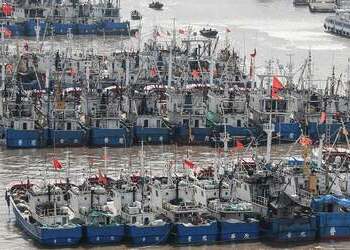China’s distant-water fishing fleet is once again engaging in suspicious and potentially illegal fishing near Argentine waters, demonstrating the limits of both regional and Chinese government attempts to rope in the country’s industry.
This year, in a re-run of last summer’s diplomatic debacle, some 350 Chinese-flagged vessels have been fishing off the Argentine coast since December, depleting fishing stocks and extending their stay via unregulated transshipments – a controversial practice of transferring catch onto a mother ship that allows vessels to launder illegally caught fish.
Between January 2018 and April 2021, satellite data shows that over 400 Chinese-flagged vessels – mostly squid jiggers that use bright lamps to draw squid to the surface at night – pillaging the waters just outside Argentine territory for over 621,000 hours, according to a report released June 2 by conservation NGO Oceana.
In over 4,000 incidents, however, these vessels disappeared from public tracking systems for over 24 hours, most likely by turning off their Automatic Identification System (AIS) to avoid detection, a controversial practice that often masks criminal behavior such as crossing into sovereign waters to fish illegally, notes the report.
SEE ALSO: French Guiana’s Unpatrolled Waters Lure Illegal Fishing Crews
This three-year period includes April 2020, when some 100 squid jiggers, mostly Chinese-flagged, were caught fishing in Argentina’s national waters with their public tracking devices apparently turned off, according to Pesca Con Ciencia.
Given the fleet’s annual fishing routes, the Chinese fleet will soon be heading parallel to Chilean and then Peruvian waters. In response to the threat the fleet poses, Peru has strengthened its counter-illegal fishing legislation, while Chile is relying on heavier maritime surveillance protocols.
InSight Crime Analysis
The Chinese fishing fleet continues to constitute a profound and perennial threat to Argentina’s sovereignty, economy and biodiversity, with one expert calling the conflict “a literal war” over the billions of dollars in fish exports and survival of certain marine habitats.
After last year’s events, Argentina took firm action to combat Illegal, Unreported and Unregulated (IUU) fishing, which constitutes the sixth most lucrative global criminal economy, with estimated revenues of $15 to 36 billion, according to a 2017 report by Global Financial Integrity. Introducing stronger legislation, increasing fines and expanding maritime surveillance led the country to capture in 2020 the highest number of illegal vessels since 2006.
Likewise, the Chinese government appeared to take some, albeit minor, steps. These included closing squid-catching seasons for Chinese boats in certain South American waters from July to November and revising various articles in its Fisheries Law, including the blacklisting of repeat IUU-fishing offenders.
SEE ALSO: Chinese Fishing Fleet Leaves Ecuador, Chile, Peru Scrambling to Respond
However, it has remained intransigent in other areas. Despite holding out hope that it would finally ratify the 2016 Port State Measures Agreement – designed to combat IUU fishing — China still has not done so, and despite capping fuel subsidies for domestic fishing, it continues to artificially sustain its distant-water fishing vessels with an estimated $400 million annual fuel subsidy.
Nor has it cooperated much with its South American counterparts. For example, while vessels intent on IUU fishing can easily turn off their AIS, it is harder to turn off their Vessel Monitoring System (VMS), which transmits confidential location information to the vessel’s flag state at set intervals.
Sharing VMS data on its distant-water fleet would therefore be an effective way for China to crack down on bad actors – yet when, during a commission for a South Pacific fisheries management body in early 2021, Chile proposed a measure allowing coastal states to request VMS data from nearby fishing boats, China outright refused.

